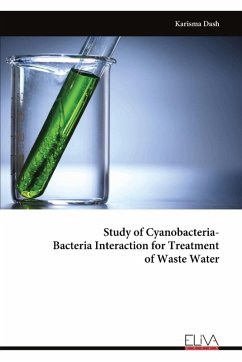The need for sustainable wastewater treatment is a major challenge today due to the depletion of water supplies and increased environmental contaminations. Existing traditional treatment methods use a lot of energy and can fall short of strict disposal requirements. Algal-bacterial systems have recently come into prominence as environmentally acceptable, long-lasting procedures for wastewater treatment and resource recovery. The symbiotic interaction between algae and bacteria is the basis for algal-bacterial systems to function sustainable. In this work attempts has been made study the effect of monoculture and hybrid culture of cyanobacteria and bacteria for the treatment of waste water from various sources and their treatment efficiency was analyzed. In our experiment four waste water samples were collected from Vanivihar drain (20.30'N and 85.84' E), H.D.M Food industry, Mancheswar (20.31'N and 85.85' E), Fish farming Pond, Utkal University (20.30'N and 85.84'E), Falcon marine export ltd., Mancheswar (20.30'N and 85.85'E) named as W1 UUD, W2 HDM, W3 FUU, W4 FME. The cyanobacteria and bacteria used for this study are Lyngbya heironymussi and Lysinibacillus macrolides collected from the laboratory cultures. The cyanobacteria and bacteria were cultured in waste water samples under axenic and co-cultured conditions. The physico-chemical parameters of the water were estimated at 6 days of inoculation and a highly significant decrease (80-97%) in Nitrate, Phosphate, Ammonia, Chloride, total hardness, DO, BOD, COD were found in waste water samples after treatment than the pre-treated concentrations. There was a 2-fold higher biomass was recorded in cyanobacteria under co-cultured condition than axenic one in W4 FME. The cyanobacteria-bacteria interaction play an important role in nutrient and pollutant removal of waste water which can be applied in environmental biotechnology and cyanobacterial biomass production.
Hinweis: Dieser Artikel kann nur an eine deutsche Lieferadresse ausgeliefert werden.
Hinweis: Dieser Artikel kann nur an eine deutsche Lieferadresse ausgeliefert werden.

